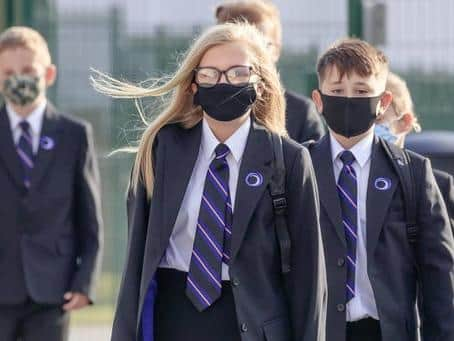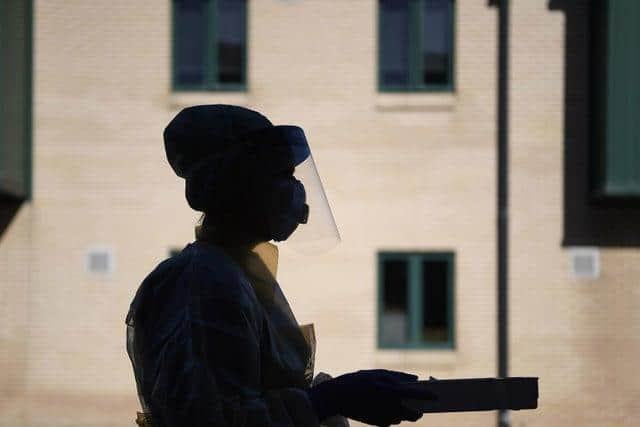School students continue to wear face masks in parts of Yorkshire due to outbreak fears
and live on Freeview channel 276
Face coverings have been recommended since the return to school in March - but that will end today, Monday, 17 May, as part of the phasing out of lockdown measures.
But in the region secondary school students in Wakefield and in Selby, are being encouraged to wear in classrooms and communal areas because of a rise in coronavirus cases.


Advertisement
Hide AdAdvertisement
Hide AdIn Wakefield the case rate in the district currently stands at 47.9 per 100,000 people, down from 61.4 at the start of the month, but still significantly higher than the national average of 21.9.
Due to the high levels Wakefield Council has taken the decision for students and staff should continue mask-wearing.
The Yorkshire Post approached Wakefield Council for comment.
One of those education institute's affected is Wakefield College.


Advertisement
Hide AdAdvertisement
Hide AdIn a statement the college said: "Unfortunately, Wakefield and our neighbouring districts continue to have some of the highest case rates in the country.
"A significant proportion of these cases are in children and young people and the NHS is only beginning to vaccinate the over 40s, who may be parents of our students and therefore vulnerable if there is an outbreak.
"Given the situation in the district, the Local Authority has recommended the continued wearing of face coverings in all secondary schools.
"In line with this advice, we have taken the decision to continue to require staff, and encourage students, to wear face coverings in College."
Advertisement
Hide AdAdvertisement
Hide AdThe statement added: "Although this is not mandatory, we would ask that students continue to wear a face covering in College, unless exempt, and that parents and carers encourage their sons and daughters to follow this request to help bring down case rates in our district."
While in Selby a local outbreak saw the infection rates rise to the fifth highest level in the country at the end of last week.
Local director of public health Louise Wallace said students and staff should continue mask-wearing in the six secondary schools in the district until half term.
Selby currently has 69.5 cases per 100,000 people in the week to 9 May, with the England average being 23.3 per 100,000 people.
Advertisement
Hide AdAdvertisement
Hide AdLast week The Yorkshire Post revealed concerns from education and health leaders in the region who expressed concerns that face masks will non longer be required in secondary classrooms in England.
Samantha Twiselton, deputy for the Doncaster opportunity area, one of three Yorkshire opportunity areas, alongside Bradford and the North Yorkshire coast, highlighted the use of masks for secondary school children was particularly important across the region.
She said in some places infection rates “remain relatively high” and there were added risk factors such as several generations living in the same household.
While Professor Mahendra Patel, a health leader in Bradford warned people need to remain vigilant across Yorkshire due to the high number of Covid-19 cases.
Advertisement
Hide AdAdvertisement
Hide AdProfessor Patel said: “I think this is too early to take this step because as we know schools are an incredible vehicle for transmitting the virus really."
Meanwhile secondary school pupils and college students in parts of north-west England will continue wearing masks because of concerns about the Covid-19 Indian variant.
The Indian variant has been detected in Bolton, Greater Manchester, in Blackburn, Lancashire and in Sefton, Merseyside, which have all seen rates rise rapidly.
In a press briefing on Friday Mr Johnson said the Indian variant of Covid-19 could "pose a serious disruption" to move to Step 4 in June as he announced planned easements of Step 3 of the Government's roadmap will go ahead from today.
Advertisement
Hide AdAdvertisement
Hide AdA Government spokesperson said: "The Prime Minister has set out the measures needed to tackle the new variant of concern.
"In line with our plans published earlier this week to address variants of concern in education we have also agreed with Directors of Public Health that face coverings will remain in place in Blackburn with Darwen, Bolton, Lancashire and Sefton.
"We are continuing to work closely with local authorities in these areas."
The Government added the situation will be kept under review in those areas and across the country.
Advertisement
Hide AdAdvertisement
Hide AdA spokesman said the use of face coverings in education will be managed on a "case-by-case basis", with decisions made by a local Director of Public Health where they affect a small number of schools, or decided by ministers where there is a widespread local issue.
And he said in all cases, any educational drawbacks should be balanced with the benefits of managing transmission.
__________
Support The Yorkshire Post and become a subscriber today.
Your subscription will help us to continue to bring quality news to the people of Yorkshire. In return, you'll see fewer ads on site, get free access to our app and receive exclusive members-only offers. Click here to subscribe.
